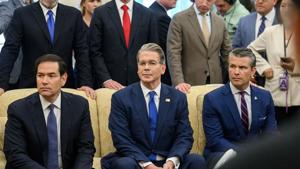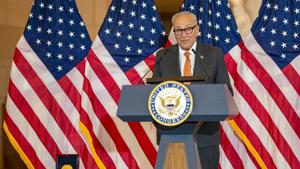Treasury sanctions Russian oil companies, calls for ceasefire
The U.S. Treasury Department announced sanctions against two Russian oil companies on Wednesday.
The department cited Russia’s “lack of serious commitment” to ending the war in Ukraine, according to a news release.
“Now is the time to stop the killing and for an immediate ceasefire,” Treasury Secretary Scott Bessent said. “Treasury is prepared to take further action if necessary to support President Trump’s efforts to end yet another war.”
The U.S. is targeting Open Joint Stock Company Rosneft Oil Company and Lukoil OAO in its sanction efforts, as well as 34 subsidiaries of the two oil companies.
The sanctions prohibit transactions for individuals or organizations within the United States between the Russian oil companies or their subsidiaries.
Over the summer, Trump levied tariffs against India, a Russian ally, over the nation’s purchase of Russian energy and oil. Trump cited the war in Ukraine as his reason for targeting India.
“The ultimate goal of sanctions is not to punish but to bring about a positive change in behavior,” the Treasury Department press release reads.
Latest News Stories

WATCH: Braver Angels CEO: Political dialogue is still possible – even in deep-blue WA

Des Moines school board chair ends U.S. Senate campaign amid superintendent controversy

Former national security advisor Bolton indicted by grand jury

Retail advocate: ‘Empty storefronts’ will result from Chicago mayor’s budget

Illinois quick hits: SNAP to cut Nov. 1 if shutdown continues; Guard-blocking order stays in place

Energy Dept’s Haustveit at Louisiana Summit: ‘More reliable energy’ needed

Trump says U.S. won’t survive without tariffs, businesses say they won’t survive with them

Nonprofit in tariff challenge case hits back at Trump

Hanover Park, Illinois, police officer arrested by immigration enforcement

Florida sues California, Washington for licensing immigrants

DOJ brings first ever Antifa terrorism charges in Texas ICE attack

Many agree with McMahon that government shutdown proves DoEd is unnecessary














